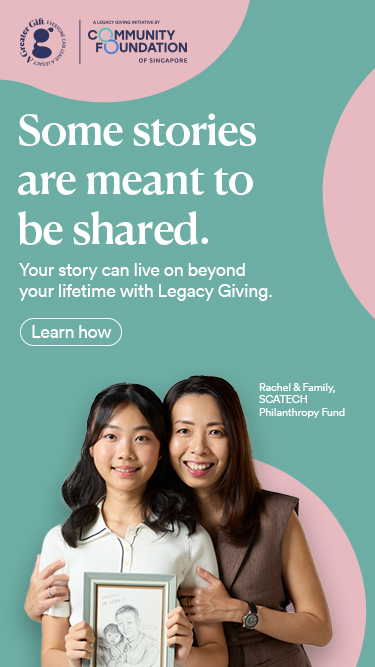Giving from strength to strength


In the Community Foundation of Singapore’s (CFS) first year of operation, few individuals wanted to talk to us about philanthropy. Thanks to a founding group of seven donors in 2008 who placed their faith in us, we started to see growth.
As CFS commemorates its 10th anniversary, we are delighted to witness how our carefully cultivated seeds to enable philanthropy have borne fruit. Earlier this month, the Straits Times published an article More wealthy donors setting up private charity funds highlighting the encouraging trends amongst private donors in Singapore and featuring two of our donors here and here.
For instance, CFS’s donor pool has grown more than ten-folds, from seven in 2008 to 110 in 2018.
Our donors increasingly include younger individuals. Today, around 40% of our donors are aged 50 and below, as compared to one such donor in 2008. We think the growth of younger donors underscores a broader, positive shift in giving attitudes, and with many latent donors in our society, we believe this number is set to grow.
As we celebrate these recent events, we are also delighted to highlight three programmes that are expanding their activities and impact through the generous contributions of our donors.
Care Corner Educational Therapy Service plugs a critical gap for children with special learning needs in mainstream schools.
Apex Harmony Lodge’s personalised model of dementia care empowers patients to live with dignity and well-being.
Tabung Project by Beyond Social Services is an innovative grassroots initiative that has enabled children from lower-income families to experience the benefits of saving.
After all, growing together – CFS, our donors and charities – is what allows us to offer the local communities we support the best means for meaningful change.
Catherine Loh
Chief Executive Officer
Community Foundation of Singapore
In the Community Foundation of Singapore’s (CFS) first year of operation, few individuals wanted to talk to us about philanthropy. Thanks to a founding group of seven donors in 2008 who placed their faith in us, we started to see growth.
As CFS commemorates its 10th anniversary, we are delighted to witness how our carefully cultivated seeds to enable philanthropy have borne fruit. Earlier this month, the Straits Times published an article More wealthy donors setting up private charity funds highlighting the encouraging trends amongst private donors in Singapore and featuring two of our donors here and here.
For instance, CFS’s donor pool has grown more than ten-folds, from seven in 2008 to 110 in 2018.
Our donors increasingly include younger individuals. Today, around 40% of our donors are aged 50 and below, as compared to one such donor in 2008. We think the growth of younger donors underscores a broader, positive shift in giving attitudes, and with many latent donors in our society, we believe this number is set to grow.
As we celebrate these recent events, we are also delighted to highlight three programmes that are expanding their activities and impact through the generous contributions of our donors.
Care Corner Educational Therapy Service plugs a critical gap for children with special learning needs in mainstream schools.
Apex Harmony Lodge’s personalised model of dementia care empowers patients to live with dignity and well-being.
Tabung Project by Beyond Social Services is an innovative grassroots initiative that has enabled children from lower-income families to experience the benefits of saving.
After all, growing together – CFS, our donors and charities – is what allows us to offer the local communities we support the best means for meaningful change.
Catherine Loh
Chief Executive Officer
Community Foundation of Singapore
- Related Topics For You: AGEING WELL, CHARITY STORIES, CHILDREN, DONOR STORIES, DONOR-ADVISED FUND, FAMILIES, INCLUSIVITY & INTEGRATION, OPINION, PERSONS WITH DISABILITIES, SENIORS, STORIES OF IMPACT, YOUTH



